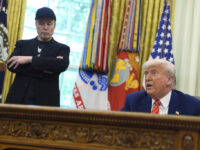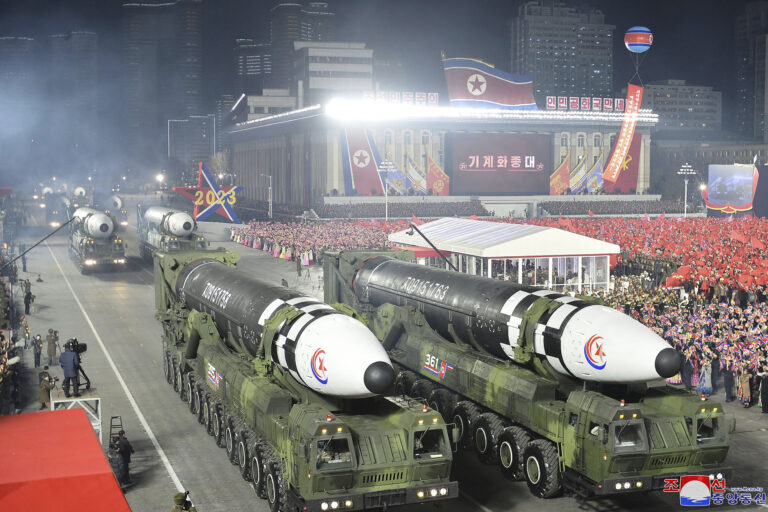By
Ryan Chan is a Newsweek press reporter based in Hong Kong, where he formerly had more than a years of experience at a regional paper, covering China and present occasions all over the world. His focus is on security and defense concerns in the Western Pacific area. He is a graduate of Hong Kong Baptist University. You can contact Ryan by emailing r.chan@newsweek.com.
Ryan Chan
China News Reporter
Voice is AI-generated. Disparities might take place.
The most recent United States intelligence evaluation cautioned that North Korea’s nuclear rockets might overwhelm the defense system safeguarding the U.S. homeland within a years.
Newsweek has actually gotten in touch with the North Korean Embassy in China for remark by e-mail.
Why It Matters
North Korea is among 9 nations equipped with nuclear weapons, having an approximated 50 warheads in its toolbox. In October, it test-fired a global ballistic rocket (ICBM), which has a prospective variety of approximately 9,320 miles– efficient in reaching the U.S. mainland.
The U.S. has actually developed a rocket defense system referred to as the Ground-based Midcourse Defense (GMD) to obstruct inbound North Korean ICBM nuclear warheads. The system includes 64 interceptor silos spread out throughout 2 military bases in Alaska and California.
The evaluation, supplied by the Defense Intelligence Agency on Tuesday, comes as the Trump administration promotes a U.S. variation of Israel’s Iron Dome air defense system– described as the “Golden Dome”– to prevent present and future aerial risks.
DIA launched an unclassified evaluation portraying the dangers an advanced rocket defense system for the U.S. would prevent. For more information, evaluation “Golden Dome for America: Current and Future Missile Threats to the U.S. Homeland.”https://t.co/nKEYjXwTgk pic.twitter.com/LWq4uEtpFM
— DIA (@DefenseIntel) May 14, 2025
What To Know
The Defense Intelligence Agency stated North Korea had actually effectively evaluated ballistic rockets with adequate variety to reach the whole U.S. homeland. “There is no part of the Homeland which cannot be struck by existing ICBMs,” the Pentagon assistance firm included.
North Korea has “10 or fewer” ground-based ICBMs, each with a variety of more than 3,417 miles and efficient in bring numerous nuclear warheads, according to the evaluation. That number is forecasted to increase greatly to 50 rockets by 2035.
 < img loading ="lazy" id="i2644935"src="https://d.newsweek.com/en/full/2644935/north-korean-intercontinental-ballistic-missiles.jpg?w=1200&f=6435f0a4890525d7c45e6e323957e293"alt="North Korean Intercontinental Ballistic Missiles"width="1200" height="800">
< img loading ="lazy" id="i2644935"src="https://d.newsweek.com/en/full/2644935/north-korean-intercontinental-ballistic-missiles.jpg?w=1200&f=6435f0a4890525d7c45e6e323957e293"alt="North Korean Intercontinental Ballistic Missiles"width="1200" height="800">This picture offered by the North Korean federal government reveals global ballistic rockets throughout a military parade in Pyongyang, North Korea, on February 8, 2023.
Korean Central News Agency/Korea News Service by means of AP
The evaluation did not predict the variety of North Korea’s submarine-launched ballistic rockets, Hans Kristensen, a nuclear specialist at the Federation of American Scientists, composed on social networks. In 2023, North Korea introduced a submarine with the capacity to fire nuclear-armed rockets.
The predicted boost in North Korean ICBMs postures a difficulty to the GMD. The rocket defense system has an “optimal engagement mode” of 4 interceptors per ICBM warhead, according to Ankit Panda, a Carnegie Endowment for International Peace nuclear expert.
In a congressional statement in 2021, the expert explained North Korea’s course to saturating the whole GMD as “eminently achievable.” While the system might fire less interceptors at each inbound ICBM warhead, doing so would minimize its general anticipated efficiency.
While the system might fire less interceptors at each inbound ICBM warhead, doing so would minimize its general anticipated efficiency.
Fort Greely, which hosts the GMD interceptor silos in Alaska, performed a simulated ICBM attack on the U.S. throughout Secretary of the Army Dan Driscoll’s check out in April. The secretary got a rundown on the GMD rocket team strategies, strategies and treatments.
< source type ="image/webp"media ="(min-width: 481px)">< img loading="lazy"id ="i2601472"src="https://d.newsweek.com/en/full/2601472/us-deploys-ground-based-interceptor-missile.jpg?w=1200&f=051dc57fef1d2c8dd1631acb84a9ea79"alt ="U.S. Deploys Ground-Based Interceptor Missile"width ="1200" height="800">
A ground-based interceptor rocket at Fort Greely in Alaska in July 2006.
U.S. Army
What People Are Saying
The U.S. Defense Intelligence Agency stated in a press release on Tuesday: “In the coming decade, missile threats to the U.S. Homeland from more advanced conventional- and nuclear-capable delivery systems will expand in scale and sophistication.”
Hans Kristensen, the director of the Nuclear Information Project at the Federation of American Scientists, composed on Bluesky on Wednesday: “Despite showing projected increases, many of the weapon types shown are not entirely new but are capabilities that the countries have had for many years, even decades.”
U.S. President Donald Trump stated in an executive order released in January: “The threat of attack by ballistic, hypersonic, and cruise missiles, and other advanced aerial attacks, remains the most catastrophic threat facing the United States.”
What Happens Next
It stays to be seen whether the U.S. will construct extra interceptor silos to manage the developing ICBM risk from North Korea, which has actually sworn not to quit its nuclear toolbox.
fairness meter
fairness meter
Newsweek is dedicated to journalism that’s accurate and reasonable.
Hold us responsible and send your score of this post on the meter.
Newsweek is devoted to journalism that’s accurate and reasonable.
Hold us responsible and send your ranking of this post on the meter.
Click Meter To Rate This Article






















0 Comments